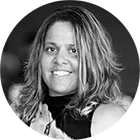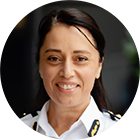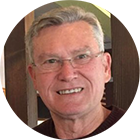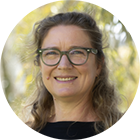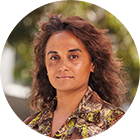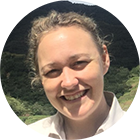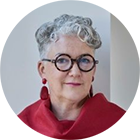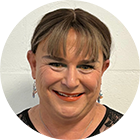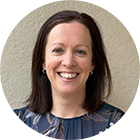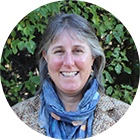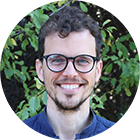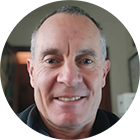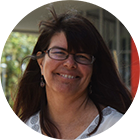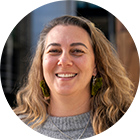Dr Margaret Moreton (GADAus)
Dr Margaret Moreton has had an extensive career spanning 40 years in the government, non-government, business, philanthropy and community sectors. She joined Gender and Disaster Australia as CEO in February 2025. Her original research was undertaken at the ANU - ‘A study of four natural disasters in Australia: how the human response to fire, flood and cyclone contributes to community resilience and recovery’ (2016).
Dr Moreton is a passionate advocate for inclusive and collaborative approaches to building resilience to disasters. Her commitment is to work so that diverse genders are safe before, during and after disasters, have a voice in building their own disaster resilience and survive, contribute, and thrive in their communities and organisations.
Trudi Graveson (WA Police)
Hi. My name is Trudi Graveson; my pronouns are she/her, and I am a proud transgender woman. My current role is with WA Police Force as a public servant (currently serving as the acting Supervisor of Radio Communications). In this role, I lead a team responsible for the maintenance and support of critical telecommunications infrastructure and end-user devices across the state, ensuring operational integrity in high-pressure and mission-critical environments. My professional journey spans over 2 decades in the government sector, including 14 years of service in the Australian Army. This experience has instilled in me a strong sense of discipline, resilience, and a commitment to public safety — values I carry with me in every role I undertake.
I am particularly drawn to the emergency management sector and am eager to deepen my expertise in disaster planning, preparedness, response, and recovery with a focus on equity, inclusion, and community resilience. In addition to my professional commitments, I have volunteered with the Australian Red Cross Emergency Services, contributing to community resilience and emergency response efforts. It was during this time that I became acutely aware of the unique challenges faced by LGBTQIA+ individuals during and after disaster situations. I am deeply committed to advocating for more inclusive emergency management practices and helping to improve outcomes for LGBTQIA+ communities in times of crisis. I believe there is still much change to be seen in this area, and I hope to be part of that change.
Clare Gibellini (Inclusive Rainbow Voices)
Clare Gibellini (she/her) is a prominent disability and human rights advocate with lived experience of multiple disabilities, including Autism. She is Chair of the National Disability Research Partnership and former Co-Chair of the Oversight Council for Australia’s first National Autism Strategy.
Clare’s work is distinguished by her leadership in climate change, disaster preparedness, and gender equality. As Policy Officer at Women with Disabilities Australia and an independent advocate, she specialises in Disability Inclusive Disaster Risk Reduction, ensuring the voices of women and gender-diverse people with disability are central in climate and emergency planning. Clare is also a board member of the Centre for Australian Progress, the Chair of the WA Ministerial Advisory Council on Disability, and an emergency services volunteer, helping build community resilience. Internationally, she has represented Australia at the UN Conference of State Parties (2022–25), and the Commission on the Status of Women (2024-25), advocating for inclusive approaches to disaster risk, climate action, and gender equity.
Erin Liston-Abel (AFAC)
Erin Liston-Abel is the Deputy CEO and Executive Director, People, Strategy and Performance at AFAC, the National Fire and Emergency Services Council (Australia and New Zealand). Erin is a senior executive with over 20 years’ experience in state government and member-based organisations within the public safety and emergency management sectors. She holds a Master of Business Administration, a Graduate Diploma in International Relations and a Bachelor of Arts. Erin is also a Graduate of the Australian Institute of Company Directors.
Erin’s portfolio within AFAC extends to strategic accountability for people and culture, strategy and organisational performance, collaboration, and the Office of the CEO. Within the people and culture portfolio, Erin has accountability for the strategic relationship with Champions of Change, and the AFAC Diversity and Inclusion Group which helps to implement gender equity initiatives as part of this relationship. Notable achievements include delivering the AFAC 2023-27 Strategy and leading the development of the fire and emergency services sector’s Strategic Directions 2022-26.
Driven by a passion for advancing gender equality and increasing representation of women in leadership, Erin joined the Women and Firefighting Australasia (WAFA) Board in 2024 to help foster an inclusive, diverse, and equitable fire and emergency services sector. By leveraging her experience in governance, strategy, and DEI, Erin is committed to supporting WAFA’s mission to empower women and advocating for gender equity through collaboration across the industry.
Dejan Greenhalgh-Tomasovic (Queensland Reconstruction Authority)
Dejan Greenhalgh-Tomasovic (he, him, his) is the Acting Director of Strategic Coordination at the Queensland Reconstruction Authority, focusing on the development of strategic, integrated approaches to disaster recovery and resilience across Queensland communities. An accredited Trainer with Gender and Disaster Australia (GADAus), Dejan combines extensive professional experience across the disaster management and recovery continuum with his lived experience as an openly gay cisgender man to support the delivery of evidence-based education, training, and resources that challenge harmful gendered expectations in disaster contexts.
Dejan is passionate about fostering inclusive, innovative solutions and building capacity in recovery and resilience to create stronger, more equitable communities.
